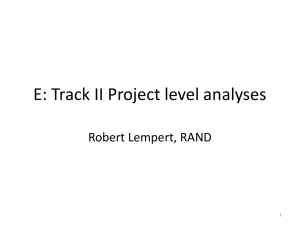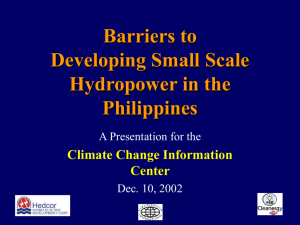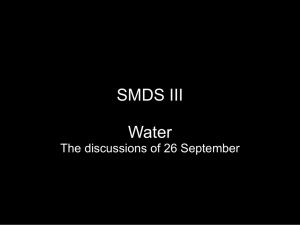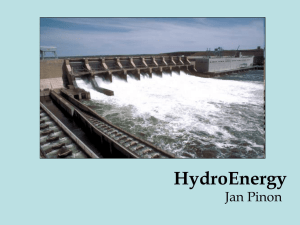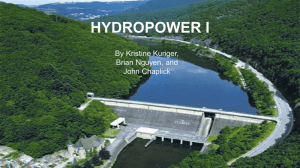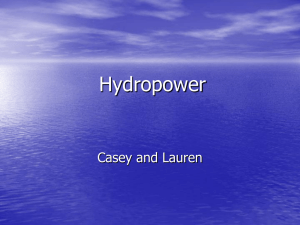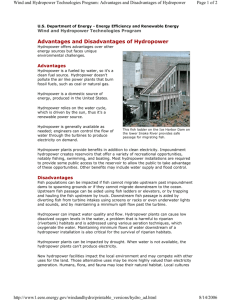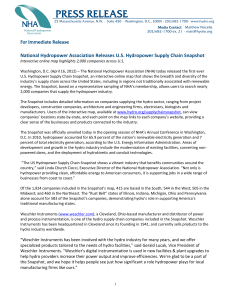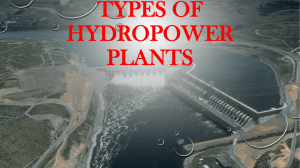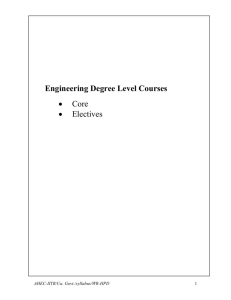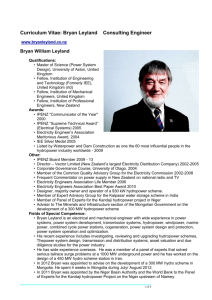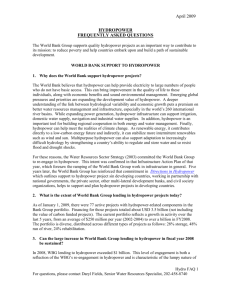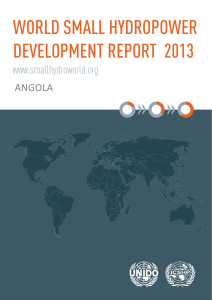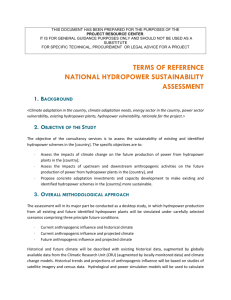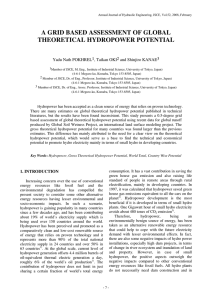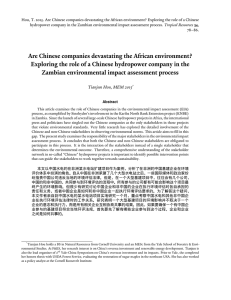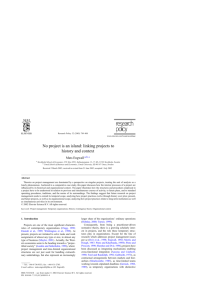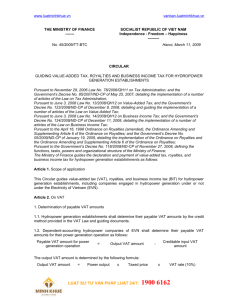for Sharing of International Best Practices in Environmental Impact
advertisement
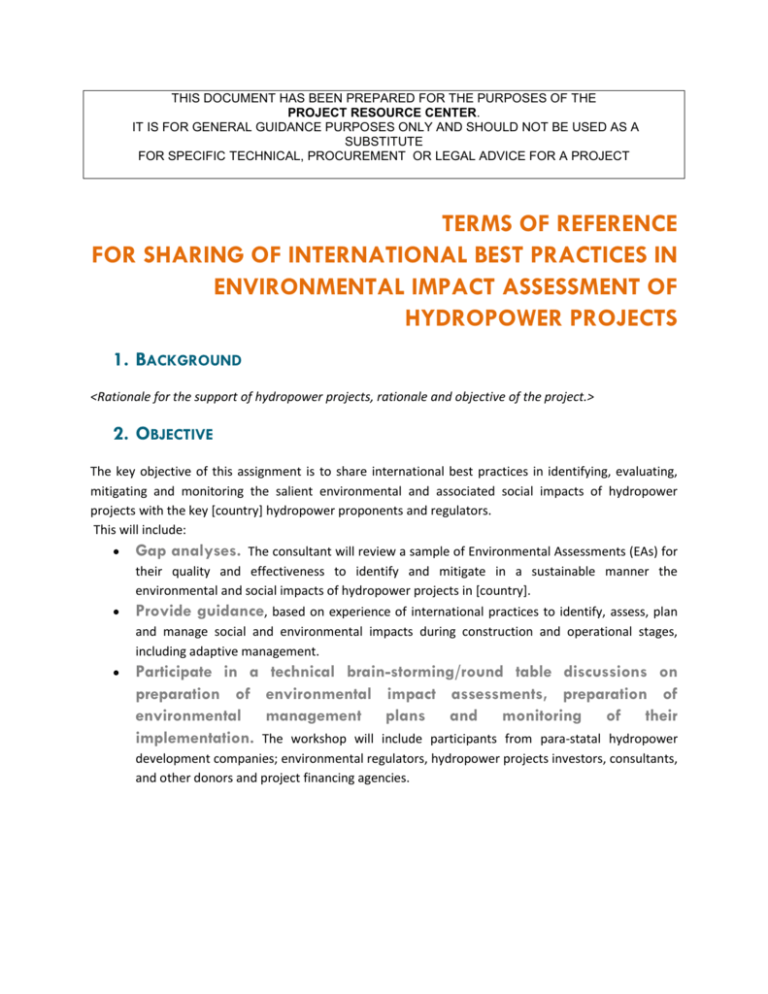
THIS DOCUMENT HAS BEEN PREPARED FOR THE PURPOSES OF THE PROJECT RESOURCE CENTER. IT IS FOR GENERAL GUIDANCE PURPOSES ONLY AND SHOULD NOT BE USED AS A SUBSTITUTE FOR SPECIFIC TECHNICAL, PROCUREMENT OR LEGAL ADVICE FOR A PROJECT TERMS OF REFERENCE FOR SHARING OF INTERNATIONAL BEST PRACTICES IN ENVIRONMENTAL IMPACT ASSESSMENT OF HYDROPOWER PROJECTS 1. BACKGROUND <Rationale for the support of hydropower projects, rationale and objective of the project.> 2. OBJECTIVE The key objective of this assignment is to share international best practices in identifying, evaluating, mitigating and monitoring the salient environmental and associated social impacts of hydropower projects with the key [country] hydropower proponents and regulators. This will include: Gap analyses. Provide guidance, based on experience of international practices to identify, assess, plan The consultant will review a sample of Environmental Assessments (EAs) for their quality and effectiveness to identify and mitigate in a sustainable manner the environmental and social impacts of hydropower projects in [country]. and manage social and environmental impacts during construction and operational stages, including adaptive management. Participate in a technical brain-storming/round table discussions on preparation of environmental impact assessments, preparation of environmental management plans and monitoring of their implementation. The workshop will include participants from para-statal hydropower development companies; environmental regulators, hydropower projects investors, consultants, and other donors and project financing agencies. 3. SCOPE The assignment will be carried out in three parts: Undertake a desk review of 5-6 sample Environmental Impact Assessment (EIA) reports for [donor] and non-[donor]-financed projects. Discuss with relevant persons (including [donor] staff) to understand current practice in [country]. Participate in experience-sharing, round table sessions. This assignment will include the following indicative tasks and activities: Task 1: Desk Review of Available EIA Reports/Studies 1. Review the sample EIAs (of 5-6 hydro projects in [country]) including Environmental Management Plans (EMP) and other related documents. The consultant shall evaluate these reports, including both environmental and social issues, for their coverage, completeness, appropriateness, and consistency with internationally accepted best practice. The consultant shall identify any significant gaps in current data, knowledge or understanding which may restrict a full and proper environmental evaluation of these projects, or which could affect the ability of the hydropower project developers to take an informed and balanced decision on various aspects of the project, including implementation of the EMP. Where relevant gaps and constraints to better EIA preparation within the context of the existing policy, regulatory and institutional frameworks including skill gaps within development companies related to the adequate management of environmental issues, are identified, these will be highlighted. 2. The desk exercise will analyze studies, methods and tools, used during design, construction and operation stages with respect to the identification and management of socio-economic, ecological and environmental impacts and risks (direct, indirect, induced and cumulative). 3. The consultant will review the following 5-6 EIA reports, as relevant: [project name] – 2 projects (Non-[donor] funded); Environmental Impact Assessment of [project name] project; [project name] – 1 EIA project (Non-[donor] funded). Task 2: Site visits, guidance on improving EIA quality and 2-day experience sharing workshop in [city] The consultant would visit two project sites to understand key issues in planning and implementation. The findings of the site visit would be an input for producing a draft report covering the following indicative technical aspects. A power point presentation summarizing findings and recommendations will be shared in a two day round table - workshop to be organized in [city], with participants drawn from the relevant government agencies, project developers and financiers and the consulting organization that are currently involved in EIAs for hydro power sector. The following indicative technical aspects would be covered to provide guidance for improving the quality of EA reports and implementation effectiveness: 1. Scoping. The guidance would include tools and methods followed as part of best international practices for scoping environmental baseline in order to assess Direct Impacts, such as the loss of flora, including rare, endangered, threatened and endemic flora; impacts on fauna consisting of invertebrates, amphibians, avifauna or birds, and mammals, including on rare, endangered, threatened and endemic fauna. Indirect & Cumulative Impacts including an assessment of effects of edge degradation and fragmentation of natural habitats, impacts on the community due to the loss of any species important for local livelihoods such as food, medicinal plants, agricultural pesticides, and impact of constantly high level of noise during operation of hydropower projects. Induced Impacts such as establishment of townships, influx of migrant laborers, induced commercial developments, induced impacts on forest cover, flora etc. 2. Key aspects of planning & design, implementation, monitoring and supervision arrangements. This may include guidance to enhance environmental aspects and mitigate any identified hazard risks including recommending augmentation of adaptive management and monitoring capacity within various institutions in [country] responsible for managing the downstream flow issues. 3. Tools, models and practices of measuring current and predicting future river flows. This would include international best practices in measuring, planning the river flow in such a way that average, maximum, mean maximum, mean minimum and absolute lean flows could be modelled or measured. 4. International best practices in assessing, planning and managing current and future social and environmental impacts of changes in: Quantity of water (such as the impacts of super saturation and turbulence at the tailrace outfall of hydro projects, probability of downstream hazards such as floods) Variation of flow (including forecasting the effects of sedimentation and flushing at upstream projects, and the associated effects of reducing organic and inorganic nutrients; reduction in dissolved oxygen; effect of the movement of gravels from flushing, and changes in downstream morphology of riverbed and [donor]). Quality (including changes on river temperature, nutrient load, turbidity, dissolved gases including dissolved oxygen, concentration of heavy metals and minerals, mercury/methyl mercury contamination, impact of sewage entering the river system; probability of water borne diseases) Uses of water (such as on downstream changing water levels, effect on shoreline vegetation, induced erosion, sedimentation and flushing), including methods of assessing future needs for irrigation, drinking water supply, sewage and storm water drainage, pilgrims’ bathing, grazing etc. 5. Tools and methods of evaluating ecological impacts. This may include international best practices in evaluating impacts on species such as fisheries, vegetation habitats, river eco system etc. Task 3: Identify suitable next steps arising from the seminar discussion 4. OUTPUT The following outputs are expected to be delivered, as per the schedule given. Items Executive Summary of reviews of EA reports (including evaluative framework) Site visit and presentation at the workshop Final Reports including guidance on good international practices Days from start 10 20 30 5. COORDINATION AND SERVICES TO BE PROVIDED BY THE CLIENT The coordination for this assignment will be provided by the [donor] staff (Environment Specialists) based in [city]. The client – [Ministry of Power] in consultation other hydro project developers such as [names] will extend necessary co-operation during the assignment, including coordinating arrangements with regard to transportation, accommodation, boarding, lodging etc. The round table/workshop will be organized in partnership with [research Institute] which will be responsible for inviting the participants and organizing other logistical arrangements for successful implementation of this experience-sharing round table.
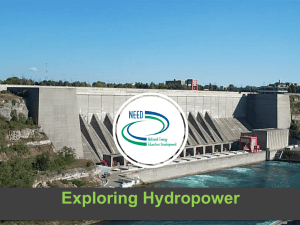
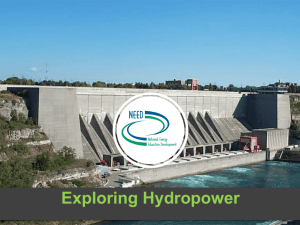
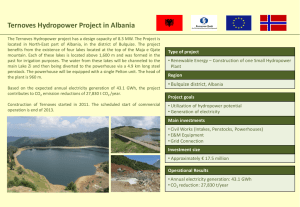
![g]kfn ljB"t k|flws/)f - Nepal Electricity Authority](http://s3.studylib.net/store/data/007576933_2-3b58397a2b5209766c421262ace21331-300x300.png)
